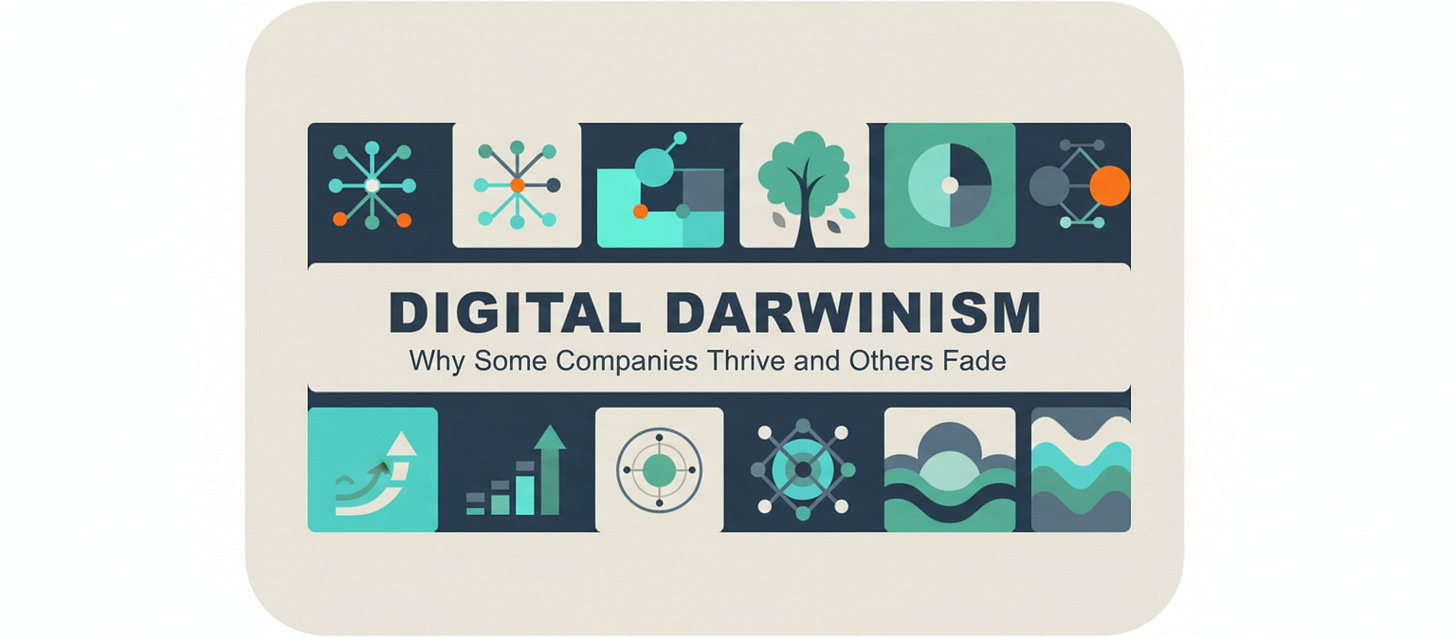The Pace of Change
We’ve seen big shifts before. The steam engine changed manufacturing. The internet reshaped media, retail, and communication. Now, AI and automation are speeding things up even more.
The pace is what makes this moment different. As Rita McGrath, a professor at Columbia Business School, put it:
“The idea that competitive advantage is sustainable over long periods is increasingly outdated. Today, it’s about transient advantage.” (Source: Harvard Business Review, 2023)
This shift is what some call “digital Darwinism.” It’s not the biggest or strongest companies that survive—it’s the ones that adapt.
What Happens When Companies Don’t Adapt
There’s no shortage of examples. Nokia dominated mobile phones but dismissed the smartphone shift, Apple and Android swept the market. Kodak had digital camera patents but stuck with film. Yahoo led early internet search but fumbled strategy and lost ground to Google.
These weren’t small mistakes. They were missed chances to change direction.
On the other hand, some companies leaned into change. Microsoft moved from software licenses to cloud services. Adobe switched to subscriptions. John Deere added sensors and software to farming equipment.
These moves weren’t just about tech. They were about mindset. They show that survival depends on being willing to let go of what worked yesterday and try something new.
What Leaders Need to Understand
For business leaders, this is a wake-up call. Success in the past doesn’t guarantee success in the future. In fact, it can get in the way.
Leaders who do well in fast-changing environments tend to do a few things differently:
- They build cultures where people can experiment.
- They treat failure as part of learning.
- They invest in people, not just tools.
As Satya Nadella, CEO of Microsoft, said in a 2024 interview:
“Our job is not to be know-it-alls. It’s to be learn-it-alls.” (Source: LinkedIn Live Interview, 2024)
That mindset matters. It’s what helps companies stay flexible and open to change.
What Technologists Should Focus On
For technologists, the challenge is to build tools that actually help people. Speed and power are important, but they’re not enough.
Good technology solves real problems. It makes things simpler. It helps people do more with less effort.
Chasing the newest trend or feature can be tempting. But it often leads to clutter, not progress. The best systems are the ones that fit into people’s lives and work without getting in the way.
When Companies Do Adapt
IBM pivoted from hardware to services and consulting—reinventing itself more than once. Netflix evolved from DVD rentals delivered by the US Postal Service to streaming, and then to content creation. Amazon started with books, became the “everything store,” and built AWS into a cloud leader.
How Companies Can Stay Ahead
There’s no single formula for staying relevant. But some patterns show up again and again:
- Keep learning: Encourage teams to try new things and share what they learn.
- Listen to customers: The best ideas often come from solving real problems.
- Stay flexible: Long planning cycles and rigid structures slow things down.
- Take smart risks: Avoiding risk completely is dangerous. But so is betting everything on one idea.
These aren’t just growth strategies, they’re survival strategies.
The Bigger Picture
This isn’t just about companies. It affects workers, communities, and the economy.
As businesses change faster, careers do too. People can’t count on staying in one job or one field for decades. Instead, they need to keep learning and adapting.
That’s not easy. It takes support—from employers, schools, and society. But it’s necessary.
As economist Erik Brynjolfsson said in a recent panel:
“Technology doesn’t automatically make things better. It depends on how we use it—and who benefits.” (Source: MIT Sloan Panel Discussion, 2024)
That’s the heart of the issue. Digital Darwinism isn’t just about tech. It’s about people.
Final Thought
The companies that thrive in this environment aren’t just good at using technology. They’re good at changing how they think, how they work, and how they lead.
Adaptation isn’t optional anymore. It’s the new baseline. As the author and business coach Victor Lipman wrote in Forbes, way back in 2014: “Adapt or die - Always true but never more so than now.”
And that’s why it matters.
Join the Conversation
Want to share your thoughts? Join the conversation at https://thebillholt.substack.com. I’d love to hear how you’re seeing these changes play out in your work or industry.


